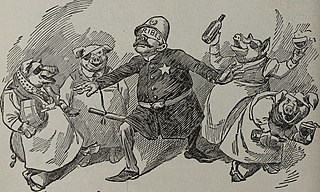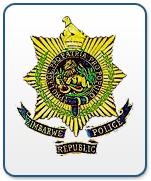
Estonia is a relatively safe country, and the risk of being a victim of crime in Estonia is small by international standards. As in other post-Soviet states, crime has increased in the 1990s, but then it has gradually decreased in the 21st century.

Police corruption is a form of police misconduct in which law enforcement officers end up breaking their political contract and abusing their power for personal gain. This type of corruption may involve one or a group of officers. Internal police corruption is a challenge to public trust, cohesion of departmental policies, human rights and legal violations involving serious consequences. Police corruption can take many forms, such as: bribery, theft, sexual assault, and discrimination.

In Argentina, the most important law enforcement organization is the Argentine Federal Police with jurisdiction in all Argentine territory. Most routine police work is carried out by provincial/state police forces. In recent years, several cities started their own local police forces to reduce the burden on the State Police. The capital city of Buenos Aires, where the Argentine Federal Police works with Argentine Naval Prefecture and Buenos Aires City Police.

Crime in Portugal is combatted by a host of government agencies including the Ministry of Internal Administration, Ministry of Justice, Maritime Authority System, Economic and Food Safety Authority, and the Informations System of the Portuguese Republic, among others. Portugal has been a member of the International Criminal Police Organization (ICPO), commonly known as INTERPOL, since 1930.

Crime in Russia refers to the multivalent issues of organized crime, extensive political and police corruption, and all aspects of criminality at play in Russia. Violent crime in Siberia is much more apparent than in Western Russia.
There is a significant crime rate in all regions of Kenya. Petty offences are the most common crime with stealing being the most reported crime. Robbery and theft are among the least cited criminal offences. Crime in Kenya is comparable to Tunisia, with a rate of 3.46 crimes per 100,000 people. However, crime in Kenya often goes unreported and police may lack the training or experience to effectively respond to crimes. Despite the reported low crime rate, Kenya faces significant challenges with organised crime, with many gangs working with corrupt police officers and sometimes even the government. Kenya has a criminality score of 7.02 on the Organised Crime Index, the 16th-most in the world, an improvement from 11th in 2021.

Crime in Qatar is very low compared to industrialized nations. Petty crime such as pickpocketing and bag snatching does occur, but is extremely uncommon. Although incidents of violence are generally considered to be rare, violence has occurred more frequently amid an increase in the population of Doha, the capital and largest city of Qatar, and economic pressures on expatriate workers over the last few years.

Crime in the Maldives ranks from low to moderate, but crime rates in the country have increased significantly in recent years. Incidents of theft on beaches or in hotels do occur. Juvenile delinquency is a growing problem in the Maldives. According to the data available from the Ministry of Defence and National Security, there has been an increase in petty crime in the country. In 1992, 169 cases of petty crime were reported, while the number was 462 in 1996. The number of sentenced persons under the age of 19 also increased from 391 in 1988 to 512 in 1998. Fraud examiner Peter Lilley in his book Dirty Dealing writes that money laundering is not a significant problem in the Maldives.
Crime in Haiti is investigated by the Haitian police. Since the late 2010s, the country has suffered from widespread gang warfare and civil unrest, including a massive prison breakout in 2024. It also suffers from extreme corruption and high levels of sexual violence.

Crime in Bulgaria is combated by the Bulgarian police and other agencies. The UK Government ranks Bulgaria as a high crime area and crime there has significantly increased in recent years, largely due to the involvement of the bulgarian mafia.
Crime in Denmark is combated by the Danish Police and other agencies.

Crime in Hungary is combated by the Hungarian police and other agencies.

Corruption in Botswana is usually regarded as one of the lowest in Africa. However, corruption is not eradicated and can still be seen in many different governmental sectors and in differing forms. Despite attempts at combating corruption, corruption in Botswana has started to get worse. The most common forms of corruption are nepotism or patronage.

Corruption in Zimbabwe has become endemic within its political, private and civil sectors.

Crime in Austria is combated by a range of Austrian law enforcement agencies.

South Korea has a relatively low crime rate compared to other industrialized countries.

On Transparency International's 2023 Corruption Perceptions Index, Senegal scored 43 on a scale from 0 to 100. When ranked by score, Senegal ranked 70th among the 180 countries in the Index, where the country ranked first is perceived to have the most honest public sector. For comparison with worldwide scores, Senegal's score was also the average score in 2023; the best score was 90 and the worst score was 11. For comparison with regional scores, the average score among sub-Saharan African countries was 33. The highest score in sub-Saharan Africa was 71 and the lowest score was 11.

Corruption in Myanmar is among the worst in the world. Owing to failures in regulation and enforcement, corruption flourishes in every sector of government and business. Many foreign businesspeople consider corruption "a serious barrier to investment and trade in Myanmar." A U.N. survey in May 2014 concluded that corruption is the greatest hindrance for business in Myanmar. The ongoing civil war has significantly set back anti-corruption efforts, exacerbating the problem.

Corruption in Guinea-Bissau occurs at among the highest levels in the world. In Transparency International's Corruption Perceptions Index for 2023, Guinea-Bissau scored 22 on a scale from 0 to 100. When ranked by score, Guinea-Bissau ranked 158th among the 180 countries in the Index, where the country ranked first is perceived to have the most honest public sector. However, Guinea-Bissau's score has either improved or remained steady every year since its low point in 2018, when it scored 16. For comparison with worldwide scores, the best score in 2023 was 90, the average score was 43, and the worst score was 11. For comparison with regional scores, the average score among sub-Saharan African countries was 33. The highest score in sub-Saharan Africa was 71 and the lowest score was 11. In 2013, Guinea-Bissau scored below the averages for both Africa and West Africa on the Mo Ibrahim Foundation’s Index of African Governance.

Crime in Latvia is relatively low, by global standards, especially compared to previous years, when it was named the "crime capital of Europe" by Forbes in 2008. The homicide rate in Latvia was 4.9 per 100,000 people in 2020, a sharp drop from 10 cases per 100,000 people in 2000, and has been steadily decreasing. Although Latvia'a homicide rate is high by European Union standards,it is below the world average of 6.2 per 100.000. The United States Department of State has assessed Latvia's security rating as "medium", with a moderate crime rate. In recent times, crime has been increasing, particularly due to many Latvians stranded because of the COVID-19 pandemic returning to Latvia and choosing to commit crime. According to Interpol, Latvia is considered an attractive place for regional and organized criminals involved in drug trafficking, arms trafficking, human trafficking, or smuggling. According to the Central Statistical Bureau of Latvia, a third of all women in Latvia have suffered some form of sexual violence or rape, while men are subjected to violence outside the family.

















